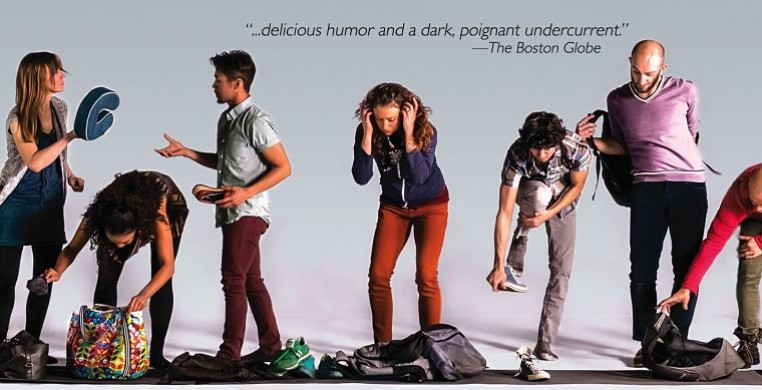The absurdity of waiting in line at airport security checkpoints is the departure gate for Lucky Plush’s Queue, at Links Hall through May 18. Co-directed and conceived by Lucky Plush artistic director Julia Rhoads and Leslie Buxbaum Danzig, founding director of 500 Clowns, the ninety-minute descent into a world of random encounters snares both performers and audience with the insatiable human need to make a story out of anything, even if it’s nothing at all.
Snippets of almost story tease us through segments of dialogue, dance, danced dialogue and music, and eventually, almost, congeal into something that wants to be meaningful. A flirtation blossoms into sudden romance for a message courier and a lawyer; a newly-married gay couple on their honeymoon have their first disconnect; repeated phone conversations between two supposed lovers reveal deception. In between, we are treated to an easy-going ride on the stream-of-consciousness of seven characters in transit, played with convincing naturalism by the laid-back Lucky Plushers.
The seeming insouciance of Queue belies a complex set of artistic objectives. Always interesting is Lucky Plush’s blend of theater and dance, spoken word and movement, danceable and non-danceable ideas. There are glimmerings of brilliance here that have not yet fully blossomed, most apparent in the fascinating interludes where the rhythms, melodies, and subtext of spoken language combine and expand into movement, simultaneously reflecting in spatial design and simple, pedestrian sequences the delicate dance of relationship, the ongoing dialogue and movement creating multiple levels of meaning. The tango sequence and a clever game of musical chairs stand out as delightfully inventive examples that skillfully build the integration of forms.
Storytelling breaks down, and bogs down, in extended segments of un-choreographed dialogue that meander out of focus for too long, scenes that promise but never quite gel. Queue gives its audience the expectation of dramatic build but doesn’t really get around to the task until about three-quarters of the way through the piece, when “six degrees of separation” connect all seven characters to a common problem. An especially focused scene, unique to the production for its dramatic weight, occurs when the disconnect between the gay couple erupts into an emotionally intense monologue. This fine theatrical moment portends a structural climax that never comes to fruition. It is unclear whether Queue aspires to tell a story about connectedness through the gradual piecing together of the puzzle, to tell the story of the ironies of family ties, or to tell the story of coincidence in chance encounters.
Despite boondoggles down backroads of Seinfeld-like dialogue around the trivial aspects of existence, Queue is easy and fun to watch. The Claudettes, musicians Johnny Iguana and Michael Caskey, provide lively piano and drums accompaniment and some comic relief. The able ensemble of dancer/actors paints the stage canvas with fluid water-color brush strokes of sweeping movement, dips and swoops in lifts and spins that have eschewed dynamic intensity and technical virtuosity for pleasant, laissez-faire limbs. As dancers, this ensemble packs some wallop that was under-used in Rhoads’ combination of pedestrian and modern dance vocabulary. As actors, and sometimes, happily, singers as well, the group proved itself quite capable, but speaking while dancing occasionally suffered from muffled diction or audibility. Any attempt to truly merge dance and theater at the highest level of both dancing and acting, choreography and stage direction, is an ambitious goal that Lucky Plush is moving toward with bold and creative strides. In the end, we, and Lucky Plush, arrive at a destination that promises a distinctive theatrical offering.

